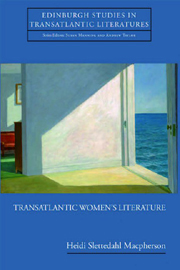Book contents
- Frontmatter
- Contents
- Acknowledgements
- Introduction: ‘No Region for Tourists and Women’
- Part 1: The Exoticised Other
- Part 2: Memoirs and Transatlantic Travel
- Part 3: Negotiating the Foreign/Re-Inventing Home
- Introduction
- 5 ‘An Invention of the Americans’: Negotiating the Foreign in Anne Tyler's Novels
- 6 Cross-Dressing and Transnational Space: Isabel Allende's Daughter of Fortune
- Conclusion
- Bibliography
- Index
Introduction
from Part 3: Negotiating the Foreign/Re-Inventing Home
Published online by Cambridge University Press: 12 September 2012
- Frontmatter
- Contents
- Acknowledgements
- Introduction: ‘No Region for Tourists and Women’
- Part 1: The Exoticised Other
- Part 2: Memoirs and Transatlantic Travel
- Part 3: Negotiating the Foreign/Re-Inventing Home
- Introduction
- 5 ‘An Invention of the Americans’: Negotiating the Foreign in Anne Tyler's Novels
- 6 Cross-Dressing and Transnational Space: Isabel Allende's Daughter of Fortune
- Conclusion
- Bibliography
- Index
Summary
Kathleen Kirby suggests that space
seems to offer a medium for articulating – speaking and intertwining – the many facets, or phases, of subjectivity that have interested different kinds of theory: national origin, geographic and territorial mobility (determined by class, gender, and race), bodily presence and limits, structures of consciousness, and ideological formations of belonging and exclusion.
As we have seen, space is central to the feminist construction of the transatlantic, no more so than in relation to images of home and the family, which are the focus of Part 3. As has been clear throughout, individuals and characters in transatlantic narratives reconstruct the transatlantic encounter as a rejection or continuation of ‘home’ and engage with the concepts of movement and stasis in deceptively simply or overtly complex ways. Moreover, the attempt to establish ‘home’ and ‘not home’ – especially through writing – inevitably entails the mythological re-creation of both through some conception of ‘the foreign’, whether that foreignness is one that is projected onto new arrivals by those already in situ (even if they, themselves, once occupied the role of new arrival or are children of such individuals), or whether the arrivals themselves see their new surroundings as foreign.
From Isabella Bird, who allowed others to think her Danish in order to hear more revealing comments about the English, but who also resisted making her temporary accommodations any more homely in order to avoid being domesticated, to Nella Larsen's Helga, who resists learning Danish well in order to remain foreign, women writers offer complex and varied responses to questions of foreignness and home.
- Type
- Chapter
- Information
- Transatlantic Women's Literature , pp. 129 - 133Publisher: Edinburgh University PressPrint publication year: 2008



